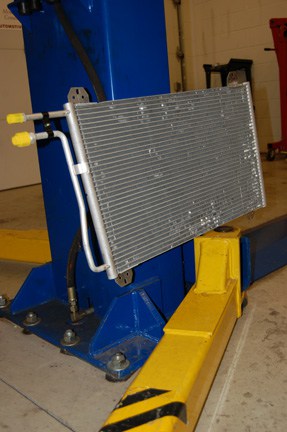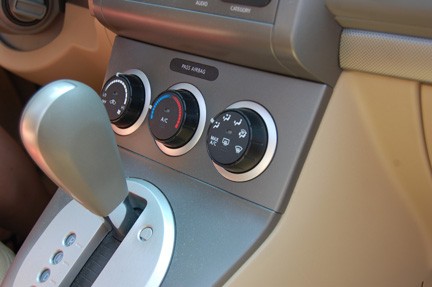What role does a condenser play in your car’s A/C system?
The condenser is the other heat exchanger in a mobile A/C system. Nowadays, condensers are usually made of aluminum, but in the past, some were made of copper/brass. Condensers look very much like radiators, just a little thinner, and since they also depend on air flowing through them, are usually located in front of the radiator.
Like radiators and evaporators, condensers are also constructed as a series of tubes with fins around them. But unlike an evaporator, whose job is to absorb heat, the condenser’s job is to release heat. More specifically, to release the heat the refrigerant absorbed while it was flowing through the evaporator, very much the same way the radiator releases the heat from engine coolant that the coolant absorbed while it was flowing through the engine. The refrigerant enters the condenser as a high-pressure vapor, but as it flows through the condenser and cools, it turns back into a cooler high-pressure liquid.
The condenser can be compared to a radiator in an engine cooling system:
• The radiator releases heat from the hot engine coolant passing through it, to the atmosphere.
• The condenser releases heat from the hot A/C system refrigerant passing through it, to the atmosphere.
Things that can go wrong with condensers
Like evaporators, condensers are also susceptible to external blockage, mostly from things like leaves, insects, or even dust. A good cleaning with water, maybe even using soap and a soft- previously mentioned, condensers are also susceptible to severe internal blockage after a compressor failure. Metal particles and other debris from the failing compressor move into the condenser with the refrigerant, and can quickly block the very small passages inside the condenser. In some instances, it may be possible to flush this debris from inside the condenser, but in many cases, the blockage is so severe that the condenser must be replaced.
Also like evaporators, condensers can suffer a seam or weld failure, resulting in leakage. But condensers must contend with something that evaporators don’t; because of their “up front” mounting location, condensers can easily suffer physical damage, from debris like small stones and such kicked up off the road, or from front-end collisions.
In the vast majority of circumstances, internally clogged, leaking, or damaged condensers are not repaired, but replaced with new units.
When having your mobile A/C system professionally serviced, insist on proper repair procedures and quality replacement parts. Insist on recovery and recycling so that refrigerant can be reused and not released into the atmosphere.
E-mail us your questions at macsworldwide@macsw.org or visit http://bit.ly/cf7az8
to find a Mobile Air Conditioning Society repair shop in your area. Visit http://bit.ly/9FxwTh
to find out more about your car’s mobile A/C and engine cooling system.



Right after browsing this article, I pondered the same thing which i always wonder when reading new sites. What do I think about it? How does this effect me personally? I am rather grateful for the weblog and how it’s developed the internet in to a substantial collection of propagated thoughts. I wound up on here after doing some job related researching on Google and one way or another discovered your site. Glad that I hung around and I will make sure to add your details to my book marks so i can come back in the future. Bye!
function of flatube
I was told I needed a new condenser in my 2008 Ford Taurus X. The owner of the garage said it would cost from 400.00 to $600.00 for this job. ( Includes parts and labor). Is this a fair price??
I just had to have mine replaced on a 2013 Chrysler 200 Convertible at the dealer. I’m $675 plus tax in Orlando FL. $280 parts, and the rest is a 3 hour labor estimate.
Is there a manufacture date on a condenser? To know the age or when it was made? Thanks!!